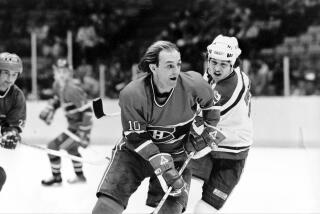HOCKEY / LISA DILLMAN : Lemieux Illness Is Latest Blow to Team With a Tragic History
- Share via
Almost everyone associated with the NHL couldn’t help but remember a couple of other names Tuesday night after hearing the stunning news that Pittsburgh Penguin star Mario Lemieux has Hodgkin’s disease:
--Bob Johnson.
--Ashley Barrasso.
Johnson, the beloved Penguin coach and guru of U.S. hockey, died of brain cancer a few months after coaching Pittsburgh to its first Stanley Cup championship in 1991. He had been in the midst of Canada Cup preparations later that summer when a malignant brain tumor was discovered.
The loss of Johnson, staggering to the Penguin organization, was just as large to the NHL and international hockey.
Ashley Barrasso is the young daughter of Pittsburgh goaltender Tom Barrasso. In the summer of 1989, Ashley was stricken with a rare form of cancer. Tom took a leave of absence from the team during the next season to be with his daughter during her debilitating chemotherapy sessions. Now, Ashley is in remission and is reported to be doing fine.
The Penguins have had a tragic thread running through the tapestry of their franchise’s history since they joined the NHL for the 1967-68 season. Early on, Pittsburgh had a player with potential star quality. He was Michel Briere, who scored 12 goals and 44 points in 76 games during his rookie year, 1969-70.
In 10 playoff games that season, he scored five goals and eight points.
Shortly after his rookie season, however, he died on May 15, 1970, from injuries suffered in an automobile accident. The Penguins still honor his memory by using his name on the rookie-of-the-year trophy, awarded at the end of each season to the player most proficient in his first season.
His number, 21, is the only jersey the Penguins have retired.
About 13 years later, tragedy hit the Penguins again when their general manager, Baz Bastien, died in an automobile accident on March 15, 1983. He had been Pittsburgh’s general manager since December of 1976, succeeding Wren Blair.
The Lemieux era started about a year after that when the Penguins made him their No. 1 pick overall in the 1984 entry draft. He entered the league with a huge splash and lived up to the billing, scoring 43 goals and 100 points to win the league’s rookie-of-the-year award. He almost single-handedly turned the moribund Pittsburgh franchise, once a laughingstock, into a force.
Later, a series of medical setbacks started to force the star center out of the lineup. It first became serious during the 1989-90 season. A herniated disk in his lower back and a degenerative arthritic condition sidelined him in February, 1990, when he was attempting to break Wayne Gretzky’s 51-game scoring streak.
Since then, it has been one long string of back problems. This season, Lemieux had been injury-free for the most part, and the medical problems seemed to vanish, causing people to think that he had a chance to reach his full potential.
Before Tuesday’s news, Lemieux already was sidelined with another back flare-up. There is a history of chronic back problems and cancer in Lemieux’s family. His father was forced into early retirement by an ailing back. And Lemieux has mentioned in public service ads for the Pittsburgh Cancer Institute that several close family members have had cancer.
Gary Bettman, who will take over as the league’s commissioner on Feb. 1, hasn’t wasted any time getting to know and understand some of his new constituents. On Tuesday, Bettman spoke with the NHL’s general managers at their annual meeting in La Quinta.
At least one general manager was impressed--the Buffalo Sabres’ Gerry Meehan, the co-chairman of the general managers’ committee.
“We covered a lot of common ground,” Meehan told the Toronto Sun. “(Bettman) assured us he sees hockey as a sport and entertainment package, not just a business.”
* MORE ON LEMIEUX: Prognosis is good for Penguin star, who is upbeat in meeting with his teammates. C7
More to Read
Go beyond the scoreboard
Get the latest on L.A.'s teams in the daily Sports Report newsletter.
You may occasionally receive promotional content from the Los Angeles Times.








